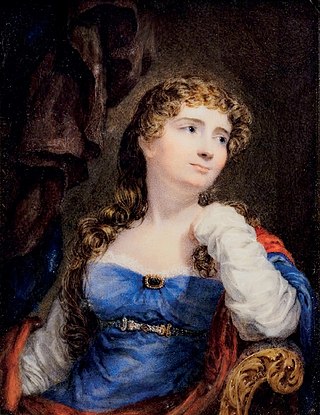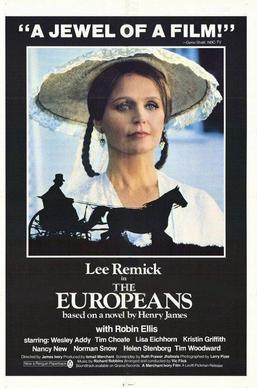
Elizabeth Barrett Browning was an English poet of the Victorian era, popular in Britain and the United States during her lifetime and frequently anthologised after her death. Her work received renewed attention following the feminist scholarship of the 1970s and 1980s, and greater recognition of women writers in English. Born in County Durham, the eldest of 12 children, Elizabeth Barrett wrote poetry from the age of eleven. Her mother's collection of her poems forms one of the largest extant collections of juvenilia by any English writer. At 15, she became ill, suffering intense head and spinal pain for the rest of her life. Later in life, she also developed lung problems, possibly tuberculosis. She took laudanum for the pain from an early age, which is likely to have contributed to her frail health.

Vivien Leigh, styled as Lady Olivier after 1947, was a British actress. She won the Academy Award for Best Actress twice, for her performances as Scarlett O'Hara in Gone with the Wind (1939) and Blanche DuBois in the film version of A Streetcar Named Desire (1951), a role she had also played on stage in London's West End in 1949. She also won a Tony Award for her work in the Broadway musical version of Tovarich (1963). Although her career had periods of inactivity, in 1999 the American Film Institute ranked Leigh as the 16th-greatest female movie star of classic Hollywood cinema.

Baroness Emma Orczy, usually known as Baroness Orczy or to her family and friends as Emmuska Orczy, was a Hungarian-born British novelist and playwright. She is best known for her series of novels featuring the Scarlet Pimpernel, the alter ego of Sir Percy Blakeney, a wealthy English fop who turns into a quick-thinking escape artist in order to save French aristocrats from "Madame Guillotine" during the French Revolution, establishing the "hero with a secret identity" in popular culture.

Flora MacDonald is best known for helping Charles Edward Stuart evade government troops after the Battle of Culloden in April 1746. Her family had generally backed the government during the 1745 Rising, and MacDonald later claimed to have assisted Charles out of sympathy for his situation.

Mary Aline Siepmann CBE, known by the pen name Mary Wesley, was an English novelist. During her career, she was one of Britain's most successful novelists, selling three million copies of her books, including ten bestsellers in the last twenty years of her life.

Katie Scarlett O'Hara is a fictional character and the protagonist in Margaret Mitchell's 1936 novel Gone with the Wind and in the 1939 film of the same name, where she is portrayed by Vivien Leigh. She also is the main character in the 1970 musical Scarlett and the 1991 book Scarlett, a sequel to Gone with the Wind that was written by Alexandra Ripley and adapted for a television mini-series in 1994. During early drafts of the original novel, Mitchell referred to her heroine as "Pansy", and did not decide on the name "Scarlett" until just before the novel went to print. PBS has called O'Hara "quite possibly the most famous female character in American history..."

Susan Sto Helit, once referred to as Susan Death, is a fictional character in Terry Pratchett's Discworld series of fantasy novels. She is the granddaughter of Death, the Disc's Grim Reaper, and has a number of his abilities. She appears in three Discworld novels: Soul Music, Hogfather, and Thief of Time. Being both human and supernatural, Susan is frequently and reluctantly forced away from her attempts at normal life to do battle with malign supernatural forces or to take on her grandfather's job in his absence. Death tends to rely on her in his battles against the Auditors of Reality, particularly in situations where he has no power or influence. As the series progresses, she also begins to take on roles educating children, so that, as Pratchett mentions in The Art of Discworld, she has "ended up, via that unconscious evolution that dogs characters, a kind of Goth Mary Poppins".

Anne Isabella Noel Byron, 11th Baroness Wentworth and Baroness Byron, nicknamed Annabella and commonly known as Lady Byron, was an educational reformer and philanthropist who established the first industrial school in England, and was an active abolitionist. She married the poet George Gordon Byron, more commonly known as Lord Byron, and separated from him after less than a year, keeping their daughter Ada Lovelace in her custody despite laws at the time giving fathers sole custody of children.

Clementine Ogilvy Spencer-Churchill, Baroness Spencer-Churchill, was the wife of Winston Churchill, Prime Minister of the United Kingdom, and a life peer in her own right. While she was legally the daughter of Sir Henry Hozier, her mother Lady Blanche's known infidelity and his suspected infertility make her paternity uncertain.

Joanna of Flanders was Duchess of Brittany by her marriage to John of Montfort. Much of her life was taken up in defense of the rights of her husband and, later, son to the dukedom, which was challenged by the House of Blois during the War of the Breton Succession. Known for her fiery personality, Joanna led the Montfort's cause after her husband had been captured by King Phillip, and began the fight-back. There, she displayed considerable skill as a military leader. Aside from her astounding skills as a military leader, Joanna functioned as a leader that the people loved.

Flora Annie Steel was a writer who lived in British India for 22 years. She was noted especially for books set in the Indian sub-continent or connected with it. Her novel On the Face of the Waters (1896) describes incidents in the Indian Mutiny.

Holiday in the Sun is a 2001 American direct-to-video romantic adventure family film directed by Steve Purcell and starring Mary-Kate and Ashley Olsen as two teenagers on vacation at Atlantis Paradise Island.

Lady Violet Georgiana Powell was a British writer and critic. Her husband was the author Anthony Powell.

The Camomile Lawn is a 1984 novel by Mary Wesley beginning with a family holiday in Cornwall in the last summer of peace before the Second World War. When the family is reunited for a funeral nearly fifty years later, it brings home to them how much the war acted as a catalyst for their emotional liberation. The title refers to a fragrant camomile lawn stretching down to the cliffs in the garden of their aunt's house.

The Europeans is a 1979 British Merchant Ivory film, directed by James Ivory, produced by Ismail Merchant, and with a screenplay by Ruth Prawer Jhabvala, based on Henry James's novel The Europeans (1878). It stars Lee Remick, Robin Ellis, Tim Woodward and Lisa Eichhorn. It was the first of Merchant Ivory's triptych of Henry James adaptations. It was followed by The Bostonians in 1984 and The Golden Bowl in 2001.

Blanche Arundell, Baroness Arundell of Wardour was an English noblewoman, known as the defender of Wardour Castle, that she defended for nearly a week with just 25 men and her maidservants against a force of 1,300.

Not That Sort of Girl (1987) is a novel by British author Mary Wesley. The novel is set in Southern England and takes its beginning in the late 1930s and follows the life of Rose Peel throughout 48 years of marriage.

Mary Wollstonecraft Shelley was an English novelist who wrote the Gothic novel Frankenstein; or, The Modern Prometheus (1818), which is considered an early example of science fiction. She also edited and promoted the works of her husband, the Romantic poet and philosopher Percy Bysshe Shelley. Her father was the political philosopher William Godwin and her mother was the philosopher and women's rights advocate Mary Wollstonecraft.
Mary Trevelyan was a British activist who was warden of the Student Movement House then founder and governor of International Students House, London, and founder of the Goats Club for foreign students. Through most of her working life, Mary Trevelyan worked to solve the problems of overseas students in London, to help them establish the best possible memory of Britain and the British people, and to promote international friendship amongst these students which could be continued even after they left Britain. Trevelyan was appointed as both an OBE and later promoted to CBE. She died in Newbury, on 10 January 1983 after a long illness.

Lady Emily Lutyens was an English theosophist and writer.



















